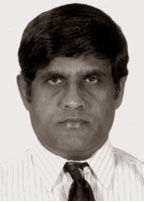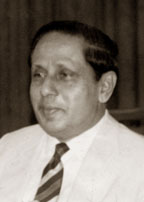|
observer |
|
|
|
|
|
OTHER LINKS |

|

|

|
Professionals on SLFP-UNP MoU
Senior Lecturer of Political Science of the University of Sri Jayawardenepura Dr. P. Athukorala: According to the concept of power, certain factors influenced the two parties to finally sign the MoU in the name of addressing national issues. The SLFP came to power with the help of the JHU and JVP. As soon as President Mahinda Rajapaksa came to power, he realized the reality in the issues. He has to find an acceptable political solution to the North and East problem. Whether we like it or not some sort of federal system is required. On the other hand, the UNP leadership is challenged and some UNPers have already crossed over. The MoU was one of the options for the UNP leadership to keep his men in his fold. Other factor is that these two major parties had played political games by exploiting the ethnic problem in the past and now they have come to a turning point. Other reason is the pressure of the international community and donor agencies.
Economist and Former Central Bank Governor Dr. Neville Karunathilake: I have my doubts about the stability and the arrangement of this cohabitation because the UNP can pull out at anytime. That is the major issue I am so much concerned about. I feel that the alliance is rather dizzy. On the other hand the alliance is not a committed one and it can break up at anytime though the two parties have signed the MoU for two years. These are legitimate doubts that I express, along with many others. Q:What are the economic benefits the country will get as a result of the stability created by the cohabitation? Dr. A: Political stability is a very important factor for a healthy investment climate. Investors will now think of investing in Sri Lanka. When two major parties are in consensus, it will give a good impression to the international community. If they can find a settlement to the national issue, certainly there will be an influx of investments as develop countries need to invest in developing countries in this globalisation process. Dr. K: Since there is no reference in the MoU between the two parties to address on vital economic issues, there is no direct bearing on the economy. However, if this peaceful atmosphere prevails, that could induce foreign investment to Sri Lanka. Q: How long can the two parties work together because the UNP's main idea is to come to power? Dr. A: Of course the UNP has their agenda. Our political parties have very narrow agendas to grab power. They don't think of the need of the country. It is commendable if both parties have formed this alliance genuinely to find a solution to the North and East problem. At the moment it is difficult to predict what will happen. Dr. K: There are conflicts policy wise. We don't know how they will resolve them finally. They must maximise cooperation between the two parties, without that no purpose can be served. If they don't cooperate fully, there can be mishaps and at the end there will not be any out come. This is the crux of the issue. I cannot make predictions as the MoU now though it claims an understanding for two years. Q: The JVP is having 39 MPs today thanks to the SLFP. With their vote base they can only get a maximum of 10 MPs. Without the SLFP, JVP know that they can not have more MPs. In this scenario, how will the JVP react to this alliance as their survival has been threatened by this new alliance? Dr. A: SLFP is a pragmatic party like the UNP. They know the reality. If they genuinely find a political solution acceptable to majority of the people, they know that they need the UNP support. If the UNP is going to give their wholehearted support to the Government without any hidden agendas, both parties are in a position to find a solution to the ethnic issue. The JVP can't exploit this problem to increase their vote base. Dr. K: There are parties which arouse communal feelings among people for their survival because of this new alliance. Q: Will this cohabitation bring any positive results to the country addressing grave national issues? Dr. A: Of course, if you look at USA, Germany and UK, they have two major party coalition Governments. But those parties have certain types of understanding. Whether UNP- SLFP like or not, they have to adjust to that situation to resolve national problems. That is a new trend in political developments in the world. We can't see a wide gap between these two parties because ideologically they are almost the same. Dr. K: The UNP has not given any major commitments to the Government. So it seems to be a superficial arrangement. It can help the country if they work together genuinely. Certainly it will bring great benefits to the country. But the question is, the six major points, they have agreed to work together only for two years. The six points are mostly non economic issues. We don't know how far they can come to an understanding on major economic issues like the cost of living, the unemployment problem, etc. The MoU has not touched these direct economic issues. Q: Can these two parties agree on certain issue in Committees because there can be disagreement on certain issues like privatisation because the SLFP is against and UNP is for privatisation? Dr. A: Yes, on some issues, the two parties have to come to an understanding and frankly talk to each other. Sometimes, either the UNP or SLFP can't follow an extreme line in the process of privatisation. The SLFP has to keep other forces intact such as the working class, intellectuals, etc.. with them when implementing liberalised policies. Dr. K: Yes, there can be disagreement on many economic issues. That may be the reason they kept out economic issues from the MoU. However, the SLFP can not ignore to address vital economic issues as it could bring negative economic results ultimately. Q: The UNP is advocating a federal solution to the North and East problem and the SLFP is for an undivided country according to the Mahinda Chinthanaya. So do you think that the two parties can find a solution to the North and East problem while being at two extreme ends? Dr. A: Non of us want to divide the country. Without dividing the country these parties can find an acceptable solution. However, they have to go for a certain federal type structure to implement the solution. Dr. K: Yes, there is major conflict on understanding on this matter. Without such understanding, I doubt whether they can find a practical solution. We don't know the content of the peace process so far and what issues they are going to agree on. There is a Tamil problem in the country at large. But we don't know what issues they will finally agree on. Q: Can the SLFP trust the UNP because they had two years of talks on the New Constitution in 2000 with President Chandrika Bandaranaike Kumaratunga's Government. But the UNP backed out when the bill came to Parliament. This is the fear among people. What are your views? Dr. A: I also agree with that. But that is not the first time such an incident happened. That has been practised since mid 50s. Banda-Chelva pact in 1957. Dudley-Chelva pact in 1959. So both parties exploited this problem for their own benefit. They did not look at the country's situation. But how can the UNP run the country without finding a solution to the civil war in the North and East? Nobody is going to win the war and it is not a solution to the ethnic problem. The SLFP and UNP can have their political agendas but they need to come to a settlement for the sake of the country. Dr. K: This is the main issue. We don't know how far these talks are going to be a success. Even on the ethnic issue, there are so many matters in conflict between the two parties. Q: Should the UNP accept portfolios in the new set up? That is the debate going on in the UNP. Some members think that without portfolios they cannot have decision making authority in proposed Committees and it is futile to be just members. What are your comments? Dr. A: Some members are very keen to accept portfolios because they have the taste of power. There are advantages as well as disadvantages when accepting portfolios. If they accept portfolios they will be a party to all economic and other problems in the country. If UNP stays out side the Government, they can exploit that situation to come to power at the next election. Many believe that Rajapaksa will continue. So they are keen to accept portfolios because all these members know the taste of power. Dr. K: Lots of people expect portfolios. But how far can the Government accommodate UNPers in the Cabinet? Therefore, I don't know whether it will ultimately take place. If they accept portfolios, then there is a better chance of the whole exercise succeeding but not otherwise. If the UNP is not accepting portfolios, it sounds unusual. Then they must be having ulterior motives in this whole exercise. That is my suspicion. Q: Will the consensus on national issues suffer if two parties try to checkmate each other forgetting what they agreed on the national agenda? Dr. A: As far as I am concerned, it is good for the country if they are having consensus on certain policy areas because then they can work together. Always the UNP is looking for power so they are not going to miss this opportunity. It is good for the country, because in an alliance each party will have a check on the other party. As a result, corruption and transparency will always be there. One of the fundamental problems in Sri Lanka is good governance and transparency. Dr. K: That is the correct word. They are going to checkmate each other and play ultimately. Q: Did the UNP strike a deal with the SLFP with the purpose of isolating the JVP from the Government? Also because today major obstacle for the UNP to come to power is the JVP. On the other hand, is it an effort of the UNP leader to keep his members in his fold? Dr. A: I don't think that because the President genuinely attempted to pressurise the JVP to join the Government. He offered portfolios to the JVP. If they accepted it, the Government did not have any problem. But the JVP declined to extend their cooperation. Dr. K: This may be a mechanism known to the government. Already the JVP has started to criticise the Government. |
 Q: How will the cohabitation between the SLFP and the UNP help to
resolve the country's key national issues?
Q: How will the cohabitation between the SLFP and the UNP help to
resolve the country's key national issues? 









